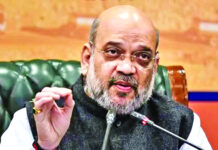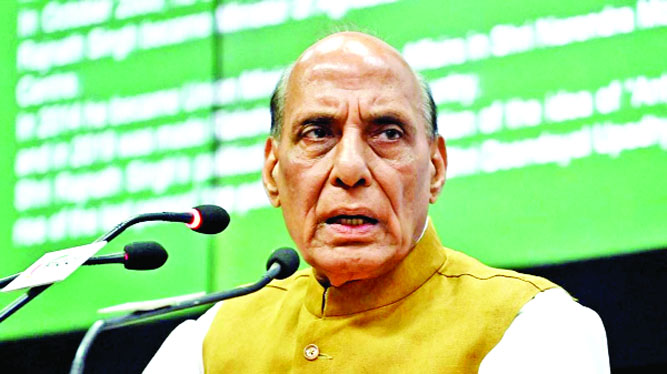DOGRA HERALD BUREAU
NEW DELHI, Oct 4
Defence Minister Rajnath Singh on Friday said at least 50 per cent of the country’s total defence production should come through the participation of the private sector.
Addressing an event by the Society of Indian Defence Manufacturers (SIDM) here, he said the Russia-Ukraine war proved that the importance of a defence industrial base has “not lessened”, rather there is a need to expand it.
Singh underlined that India was an “import-dependent nation” earlier in the defence sector, but the country is taking strides towards defence exports.
He urged the stakeholders in the defence sector to keep seeing the export and import figures, and said with a target-oriented approach, the ratio between the two can be reduced.
“You know well our thinking and policy in the defence sector. Our government will not only continue those efforts but will endeavour to accelerate them as much as possible. Efforts to achieve self-reliance will be made more vocal, this is a firm conviction of our government,” Singh said.
The defence minister highlighted government initiatives like the corporatisation of the Ordnance Factory Board, the establishment of two industrial defence corridors, and the encouragement of private industry by the DAP to enhance the role of the private sector in defence manufacturing.
“We created an environment of ease of doing business in the country,” Singh said.
He also spoke of the “record growth” in the value of defence production in the country in 2023-24.
In July, Singh said, “India has registered the highest ever growth in the value of defence production in 2023-24. The value of production has reached Rs 1,26,887 crore in 2023-24 which is 16.8 per cent higher than the value of production of the previous financial year”.
At the SIDM event, he said, “If we look closely, then we realise that the majority share is being generated by PSUs, DPSUs, with a share of Rs 1 lakh crore, while private sector share is only about Rs 27,000 crore.”
There is a “big scope” to increase the participation of private industry in total defence production, he said.
“We wish to see it at least 50 per cent of the total defence production. It should be our target, and the government stands by you in making efforts towards achieving this,” Singh added.
In his address, he also alluded to the prolonged Russia-Ukraine war.
He said some experts have said that the form of warfare was not the same as it was before, rather it has changed.
But, this war shows that the importance of a defence industrial base has not lessened from what it was before, rather in the coming times, there will be a need to expand it, he said.
“So, the government is ready to make all efforts,” the defence minister said.
Singh also spoke of the five positive indigenisation lists (PILs), under which 509 pieces of equipment have been identified whose production will be done in India.
“This list of 509 items is not static, it is a dynamic list which should keep reducing with time. We should assess on what items in the first list, we have achieved ‘atmanirbharta’. Our efforts should be to achieve full self-reliance on these items over time, and shorten the list,” he said.
“Besides, for the defence PSUs also we released five positive indigenisation lists, under which over 5,000 such equipment have been identified which will be built in India by Indian hands,” the minister said.
This list is definitely an “aspirational benchmark” for the private sector, he said.
“This list, the work and its progress should be seen not only by the government, but you should also take a step in this direction. See for yourself, if the domestic manufacturing industry can work on these PILs. And, if any issues are there they they should be resolved,” Singh added.
It’s not about increasing the number in the PILs, if it’s not feasible then remove it. This list may have been brought to make the defence sector ‘atmanirbhar’, but ultimately this list is dedicated to you, and you have to do it, he said.
The list is indeed prepared after consultations, but the way the defence sector globally is changing rapidly, “I will appeal to you to think what new can be done to it,” he added.
The defence ministry in July had said that the Defence Public Sector Undertakings (DPSUs), Department of Defence Production (DDP), had notified the fifth PIL consisting of 346 items.
Earlier, four PILs comprising 4,666 items were notified by the DDP for DPSUs, of which 2,972, having import substitution value worth Rs 3,400 crore, have already been indigenised.
These five lists for DPSUs are in addition to the five positive indigenisation lists of 509 items notified by the Department of Military Affairs (DMA). These lists include highly complex systems, sensors, weapons and ammunition, it had said in a statement.
Till June 2024, over 36,000 defence items were offered to the industry for indigenisation by the DPSUs and SHQs (Service Headquarters).
Of them, more than 12,300 items have been indigenised in the last three years. As a result, the DPSUs have placed orders on domestic vendors to the tune of Rs 7,572 crore, the ministry has said.



























